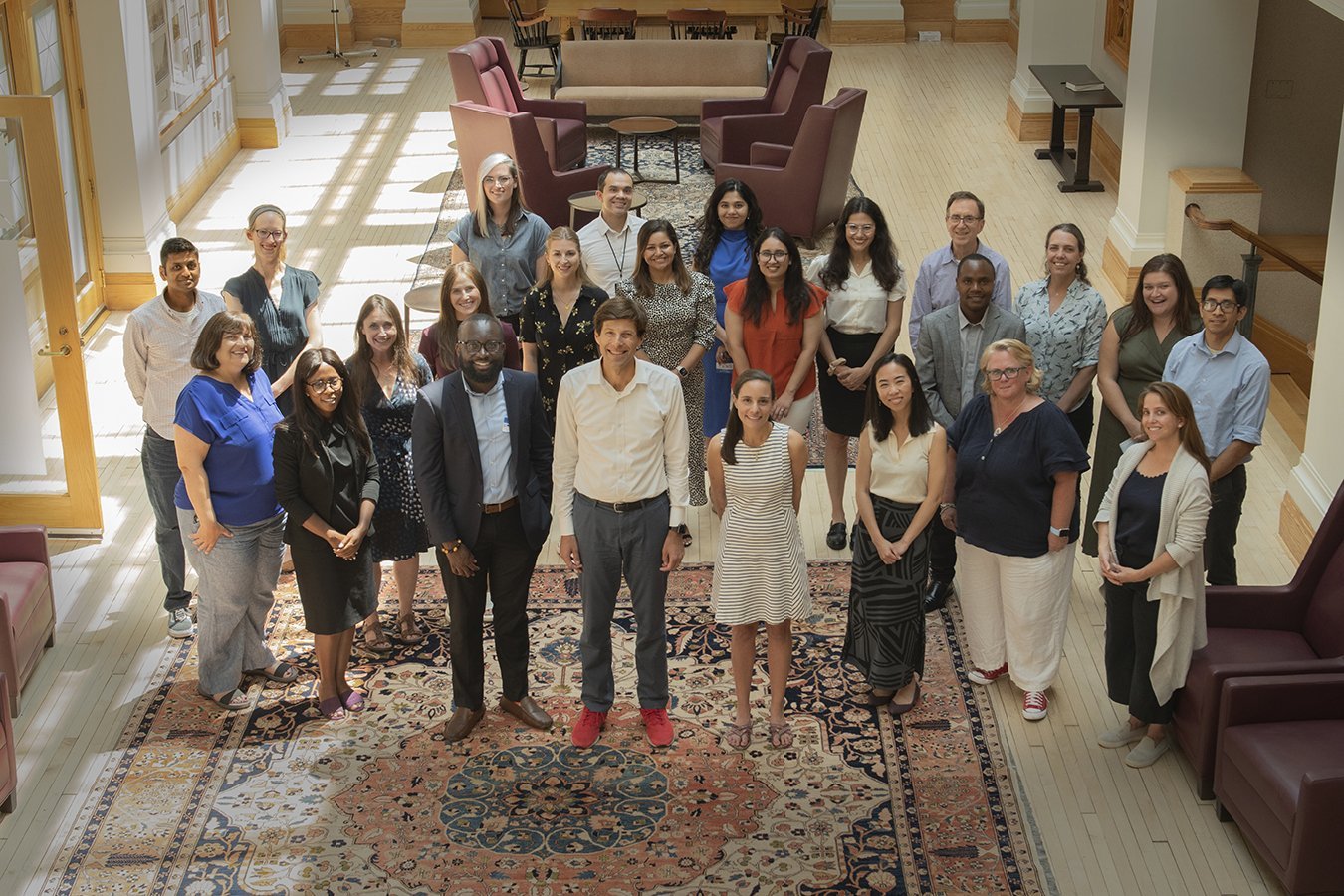World Health Organization Recognizes Center for Leadership in Integration Science
Center for Integration Science in Global Health Equity faculty and staff gathered at Harvard Medical School in July 2022. Dr. Gene Bukhman is center front. Photo by Stu Rosner.
The Center for Integration Science in Global Health Equity has been named a WHO Collaborating Centre in recognition of its work in designing integrated care delivery systems for people living with severe noncommunicable diseases in extreme poverty.
Childhood heart diseases, type 1 diabetes, and sickle cell disease customarily fall into disparate clinical specialties. Even so, those conditions share certain disheartening characteristics: They’re all severe, chronic noncommunicable diseases that cannot be prevented. Their treatment protocols are complex. And, when left untreated, they kill the world’s poorest children and young adults at devastating rates.
Fortunately, these diseases also share a clinical cadence, and it’s in that pattern of services that the field of integration science can offer a solution. In this instance, the Center for Integration Science in Global Health Equity at Brigham and Women’s Hospital has been working with an international network to integrate expertise and resources across these diseases to save young lives in rural sub-Saharan Africa and South Asia, where 90 percent of the world’s poorest people live.
For its leadership work in integration science, the Center for Integration Science was recently named the WHO Collaborating Centre on Integration Science and Service Delivery. With this designation from both the World Health Organization and the Pan American Health Organization, the center joins a global network of organizations supporting WHO initiatives.
“We’re honored that both the World Health Organization and the Pan American Health Organization are recognizing our work,” said Gene Bukhman, MD, PhD, executive director of the Center for Integration Science. “We also appreciate the value they’re placing on integration science, a relatively new field that has tremendous potential for delivering care to the people who need it most, which is an essential ingredient in achieving global health equity.”
In many low- and lower-middle income countries, care services for severe, chronic noncommunicable diseases are available only at referral hospitals in major cities, making treatment both inaccessible and unaffordable for the rural poor. As a result, many children and young adults die prematurely — and preventably. The model the Center for Integration Science principally uses, PEN-Plus, addresses this gap by bringing lifesaving care to first-level rural hospitals.
In aiming for an optimal configuration of health care resources, PEN-Plus trains mid-level providers such as nurses and clinical officers to provide crucial services across these diseases. Last summer, all 47 member states of the WHO Regional Office for Africa adopted PEN-Plus as their official strategy for providing care for people with severe noncommunicable diseases.
As part of its WHO Collaborating Centre mandate, the Center for Integration Science will provide technical support to WHO’s work in characterizing and classifying existing models of integrated care for noncommunicable diseases, collaborate with WHO in the integrated care of these diseases in selected countries, and share best practices and lessons learned in the implementation of integrated care of these diseases. The WHO Collaborating Centre designation is slated to continue through April 2027.
The Center for Integration Science is a joint initiative of Brigham and Women’s Hospital, Harvard Medical School, and Partners In Health. In addition to pursuing an ambitious research agenda, the center serves as the Boston co-secretariat of the NCDI Poverty Network, a global partnership that seeks to bridge the gap in universal health coverage for the world’s poorest billion.
The only other current Harvard-affiliated WHO Collaborating Centre — the Program in Global Surgery and Social Change — is also based at both Harvard Medical School and Brigham and Women’s Hospital. Past Harvard-affiliated WHO Collaborating Centres include three at the Harvard T.H. Chan School of Public Health (one on the biostatistical evaluation of cancers from 1981 to 1994, one on health legislation from 1987 to 2004, and one on nutritional epidemiology and advanced training in public health nutrition from 1993 to 1999); one at Brigham and Women’s Hospital (on surveillance of antimicrobial resistance from 1985 to 2021); and one at Harvard Medical School (on research and training in mental health from 1987 to 1994).

